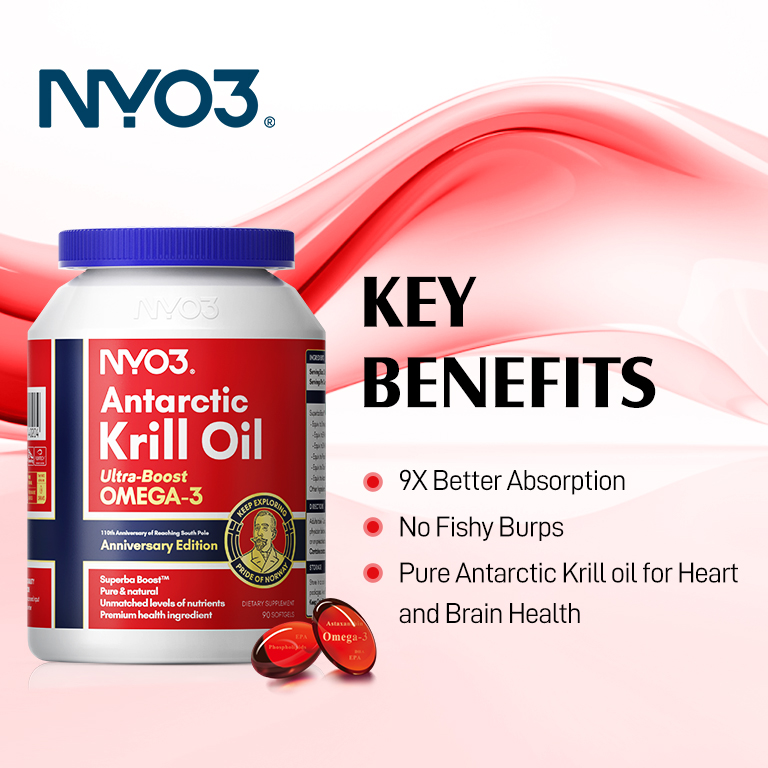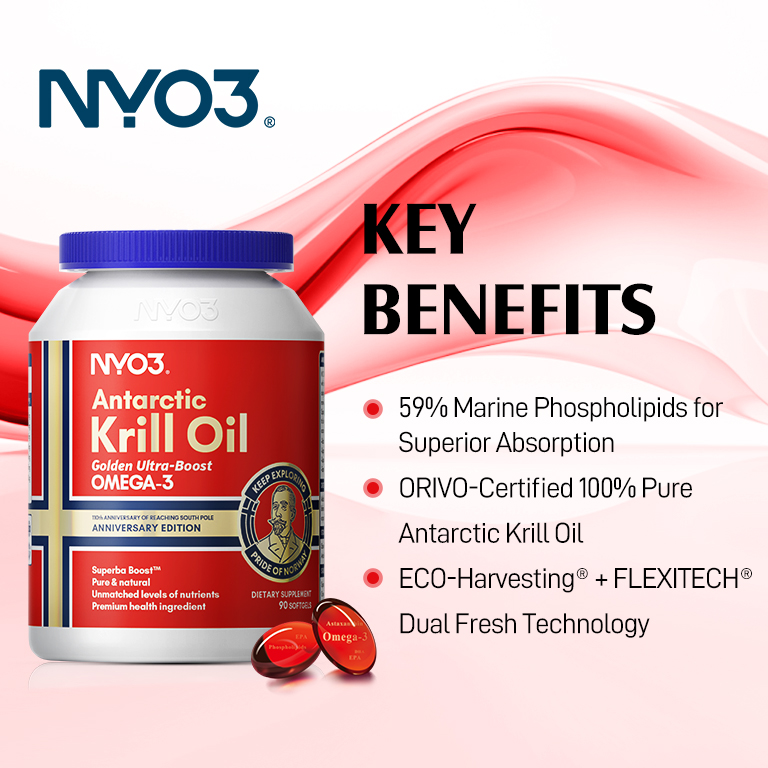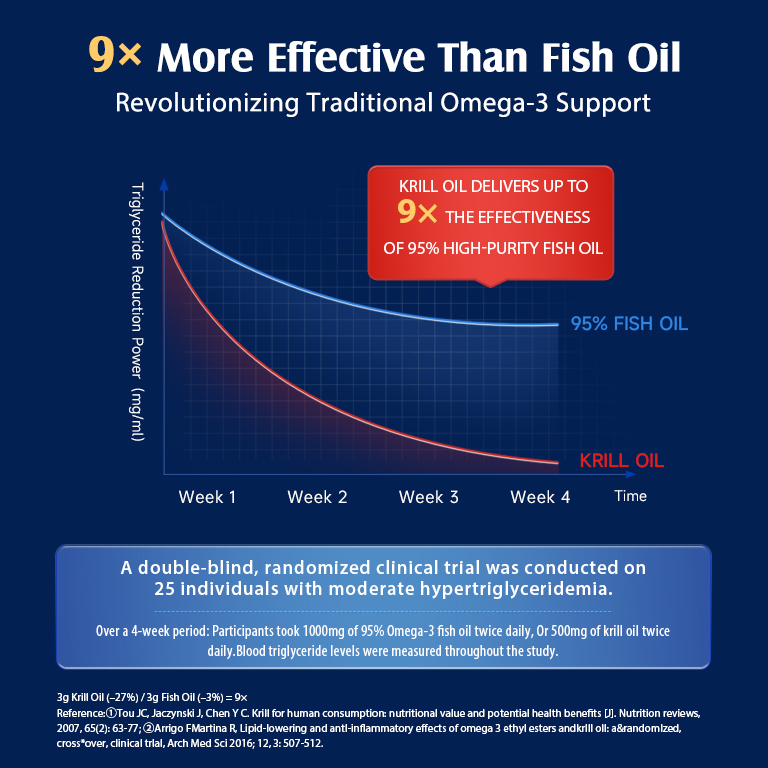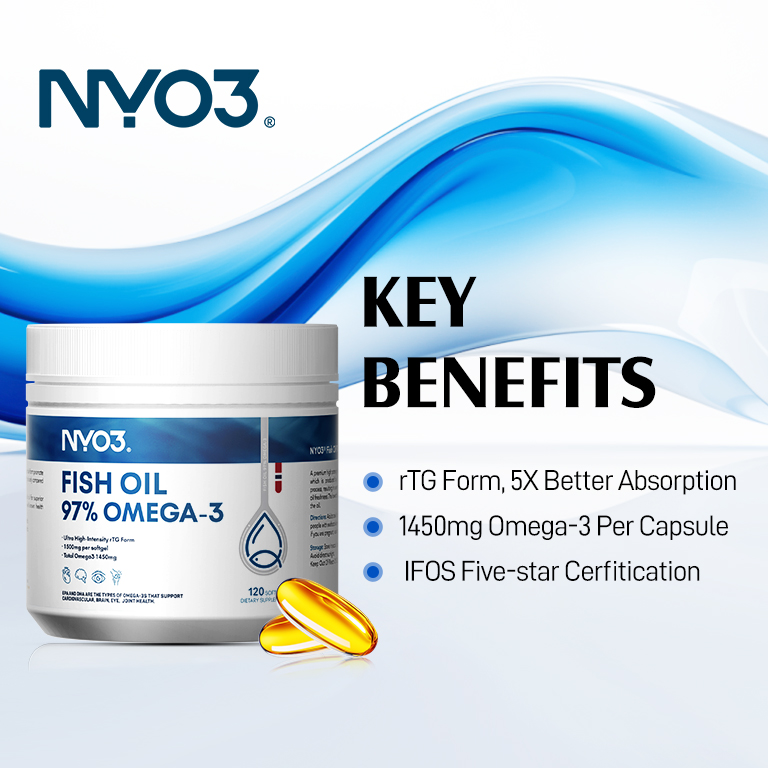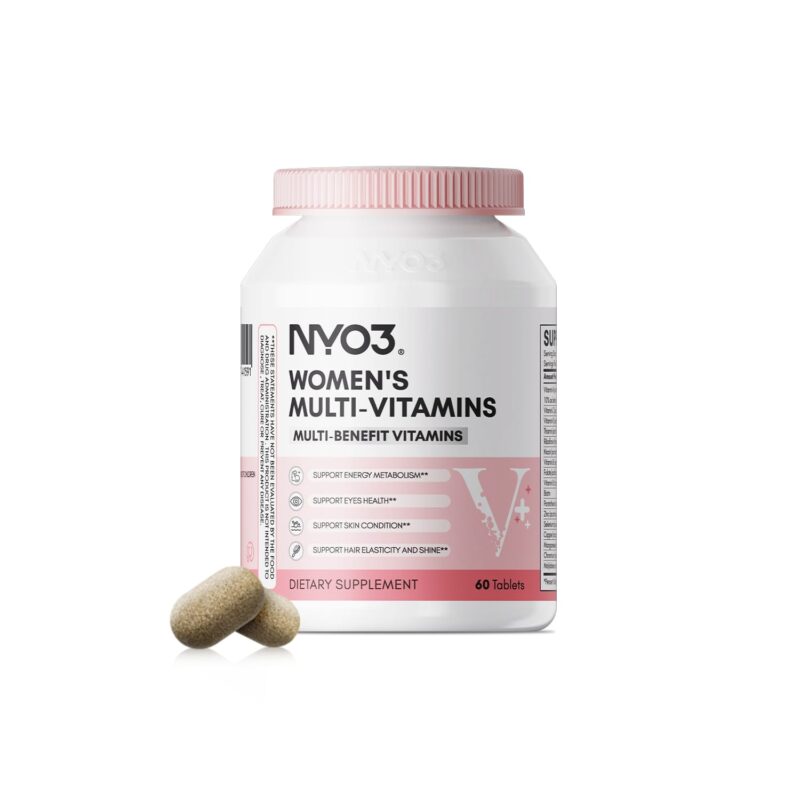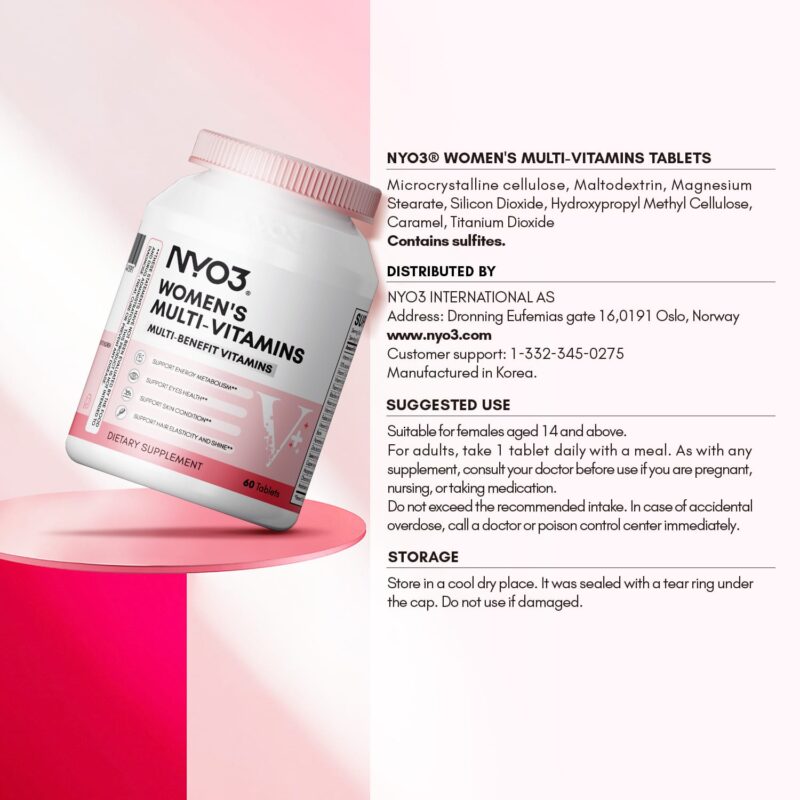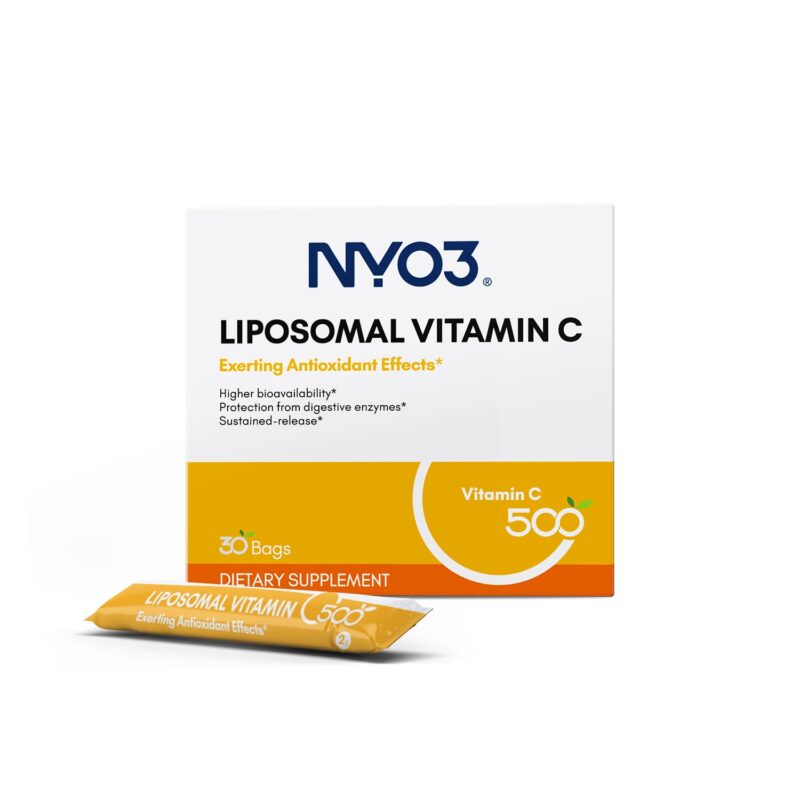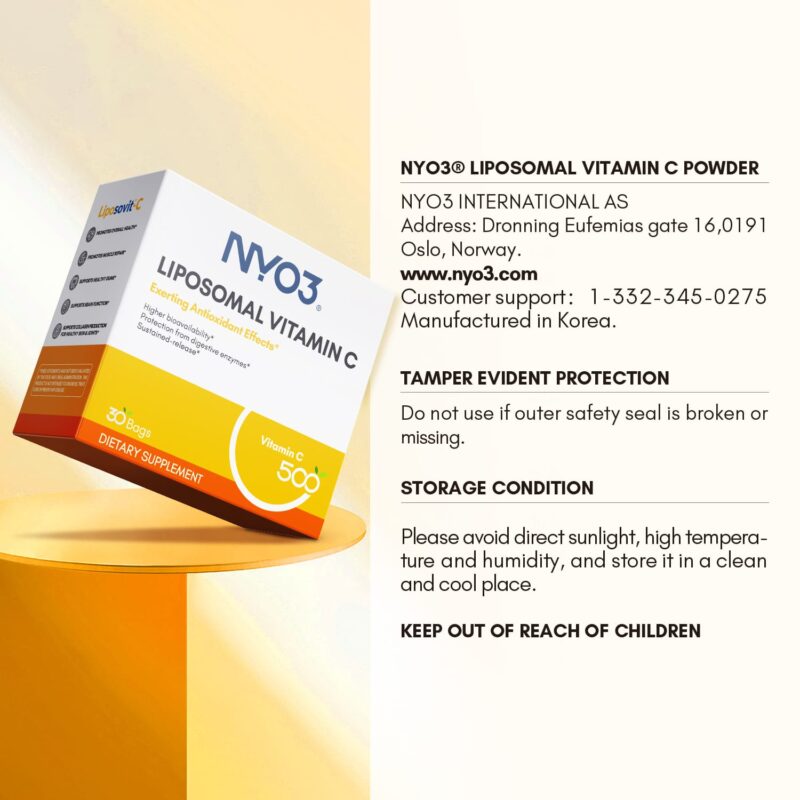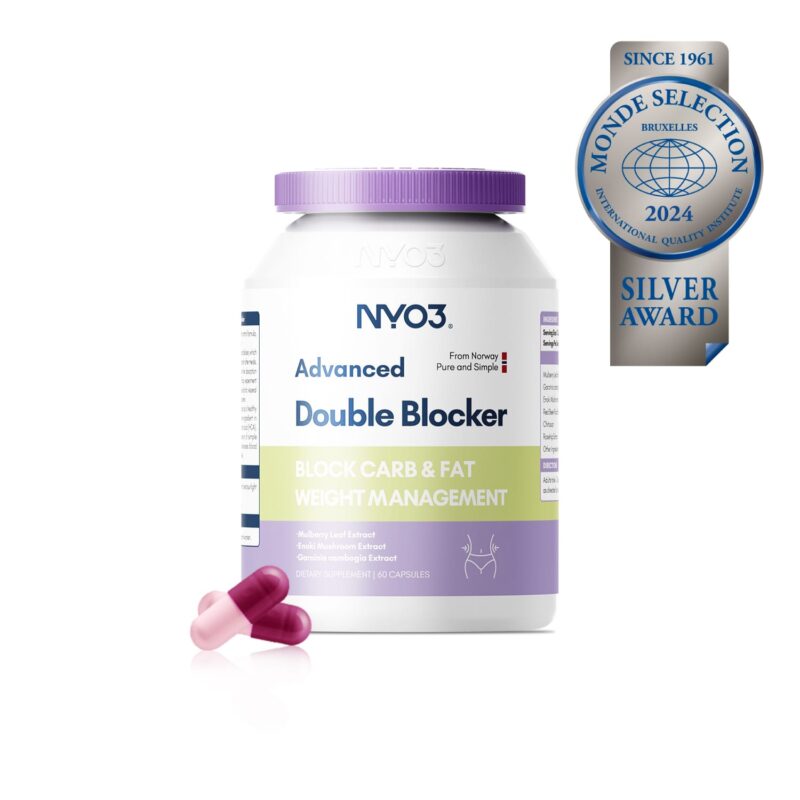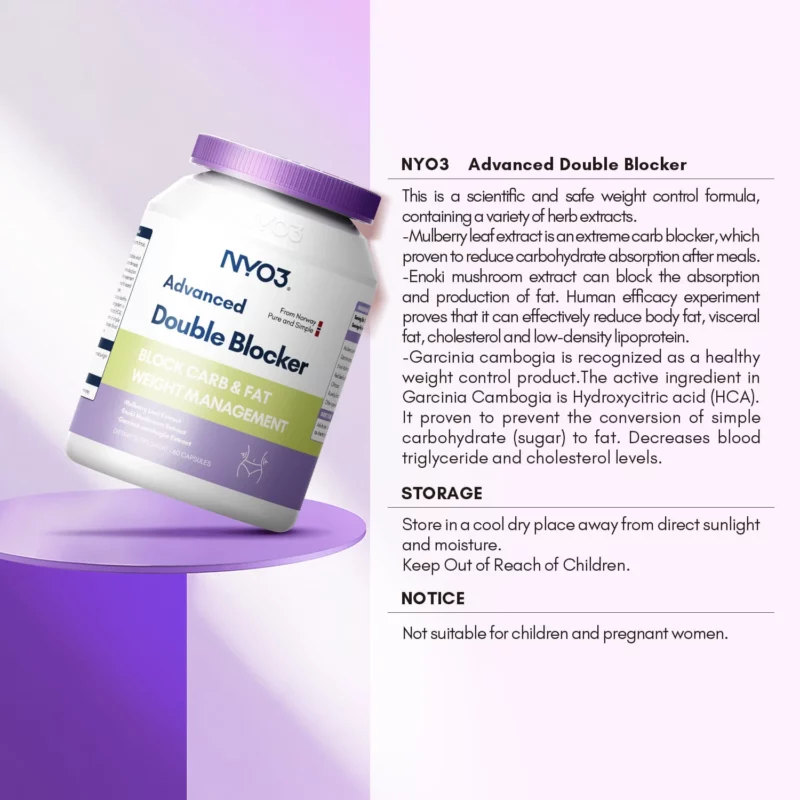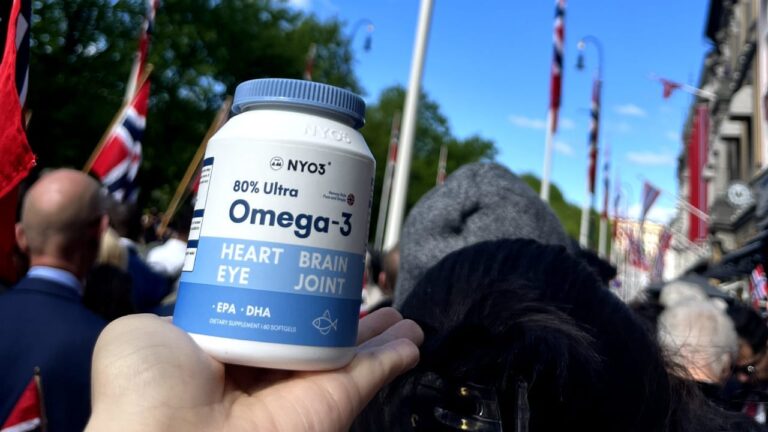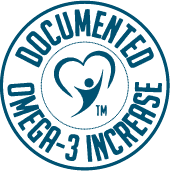The 7 Best Omega-3 Fish Oil Supplements, According to Pharmacists!
Fish oil supplements have become popular for their potential health benefits. These supplements contain omega-3 fatty acids, which play a key role in many bodily functions. Fish oil may help support heart health, brain function, and eye health. It might also aid in managing conditions like high blood pressure and PCOS. Some studies even suggest fish oil could boost your immune system and improve mental well-being.
Choosing a good fish oil product is crucial to get the most benefits. Not all supplements are created equal. The quality, purity, and omega-3 content can vary widely between brands. You’ll want to look for a supplement that’s been tested for contaminants and provides an effective dose of EPA and DHA, the main types of omega-3s. By picking the right fish oil supplement, you can better support your overall health and potentially reduce your risk of certain health issues.
Best Omega-3 Fish Oil Supplements
NYO3® 97% Omega-3 Fish Oil 1,500mg
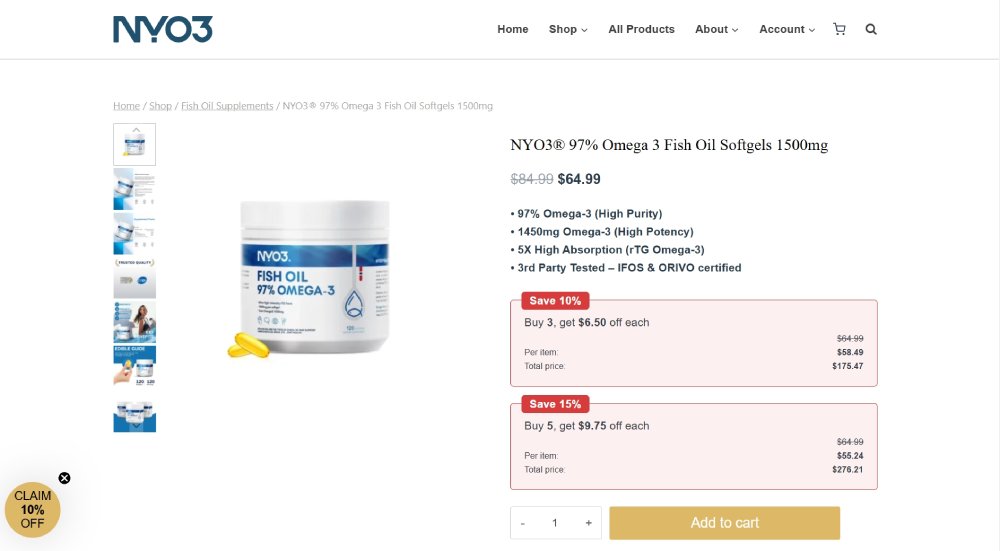
NYO3® 97% Omega-3 Fish Oil packs a powerful punch with its high concentration of omega-3 fatty acids. This supplement provides 1,500mg of fish oil per serving, with an impressive 97% omega-3 content.
The product uses a unique purification process to remove impurities and concentrate the beneficial omega-3s. This results in a supplement that’s both potent and easy to digest.
Pros:
- High omega-3 concentration
- Purified for better absorption
- Less fishy aftertaste
- Third-party tested for purity
- Supports heart and brain health
Cons:
- Higher price point
- Large capsule size may be hard to swallow for some
NatureMade Fish Oil 1,200mg Softgels
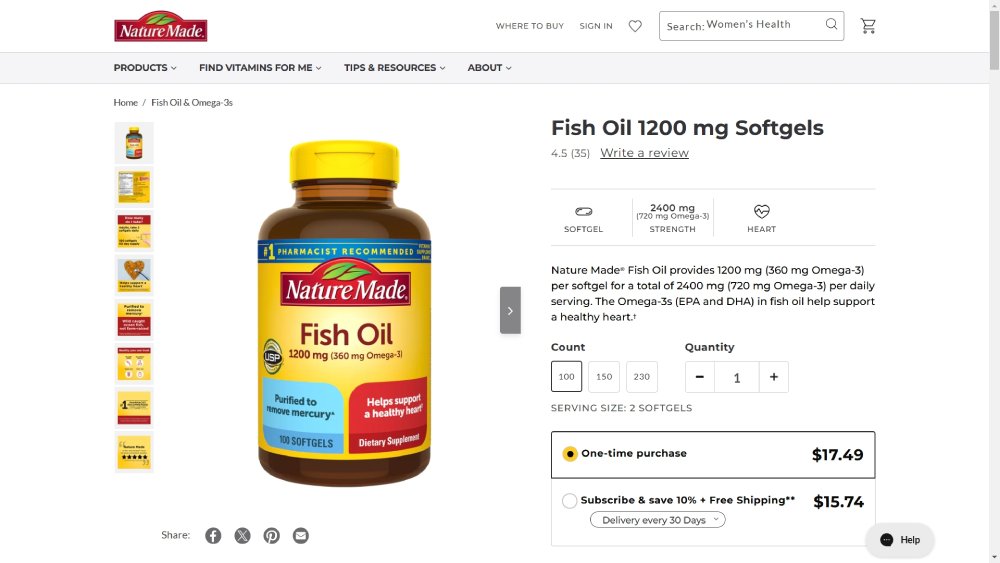
NatureMade Fish Oil is a popular choice among pharmacists and consumers alike. Each softgel contains 1,200mg of fish oil, providing a good dose of omega-3s in an easy-to-take form.
This supplement is USP verified, ensuring its quality and purity. It’s also free from artificial colors, flavors, and preservatives.
Pros:
- USP verified for quality
- No artificial additives
- Affordable price point
- Supports heart health
- Easy to find in most stores
Cons:
- Lower omega-3 concentration compared to some competitors
- Some users report a fishy aftertaste
Nature’s Bounty Fish Oil 1,200mg Softgels
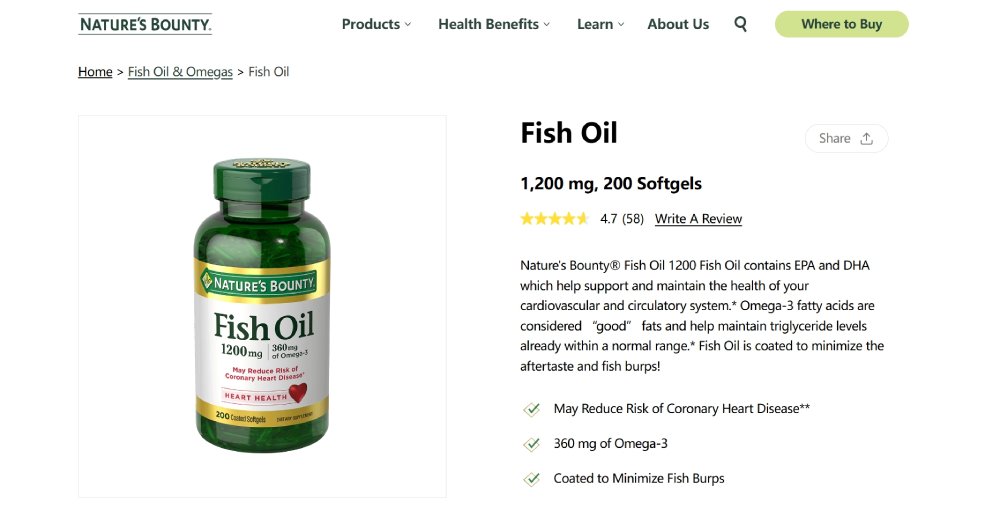
Nature’s Bounty Fish Oil offers 1,200mg of fish oil per softgel. This supplement is designed to support heart, joint, and skin health.
The product undergoes a special purification process to remove mercury. It’s also tested for potency and quality throughout the manufacturing process.
Pros:
- Purified to remove mercury
- Supports multiple aspects of health
- Non-GMO
- Affordable option
- Easy to swallow softgels
Cons:
- Lower omega-3 concentration than some alternatives
- Some users report fishy burps
Nordic Naturals Omega-3 1,280mg Softgels
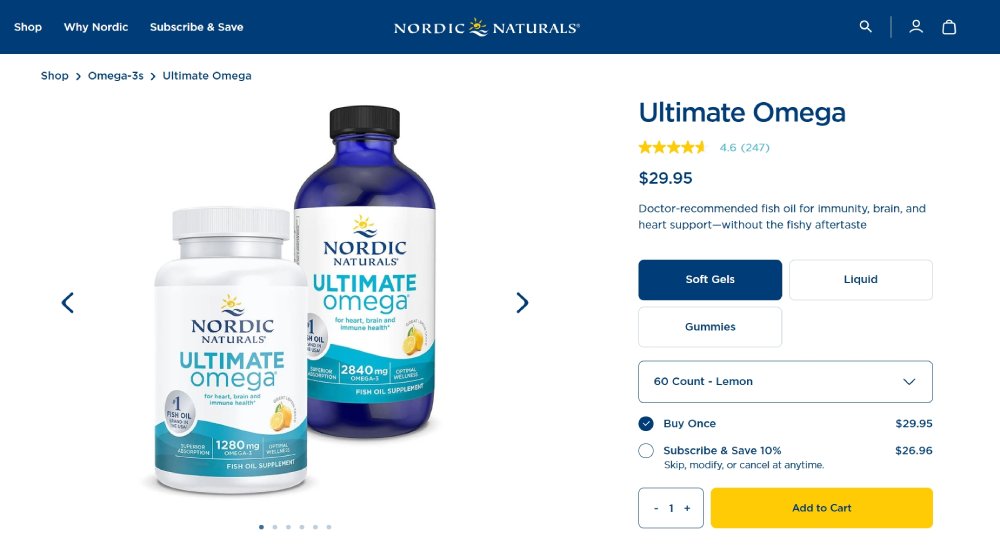
Nordic Naturals is known for its high-quality fish oil supplements. Their Omega-3 softgels provide 1,280mg of fish oil per serving, with a good balance of EPA and DHA.
This product is made from wild-caught, sustainably sourced fish. It’s also third-party tested for freshness and purity.
Pros:
- High-quality, sustainably sourced fish oil
- Good balance of EPA and DHA
- Third-party tested
- Fresh lemon flavor masks fish taste
- Supports heart and brain health
Cons:
- Premium price point
- Large capsule size
Sports Research Fish Oil 1,250mg Softgels
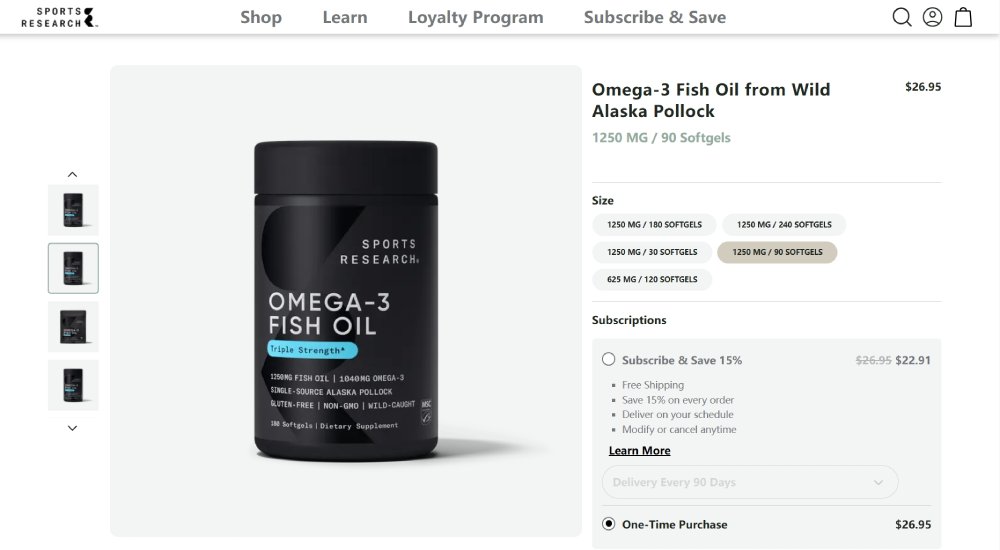
Sports Research Fish Oil offers 1,250mg of fish oil per softgel. This supplement is enhanced with vitamin E to help preserve freshness and potency.
The product uses AlaskOmega® fish oil, which is sourced from wild-caught Alaskan Pollock. It’s also certified by Friend of the Sea for sustainability.
Pros:
- Sustainably sourced fish oil
- Added vitamin E for freshness
- Non-GMO and gluten-free
- Third-party tested
- Supports joint and heart health
Cons:
- Slightly higher price point
- Some users report fishy burps
Carlson The Very Finest Fish Oil 1,600mg
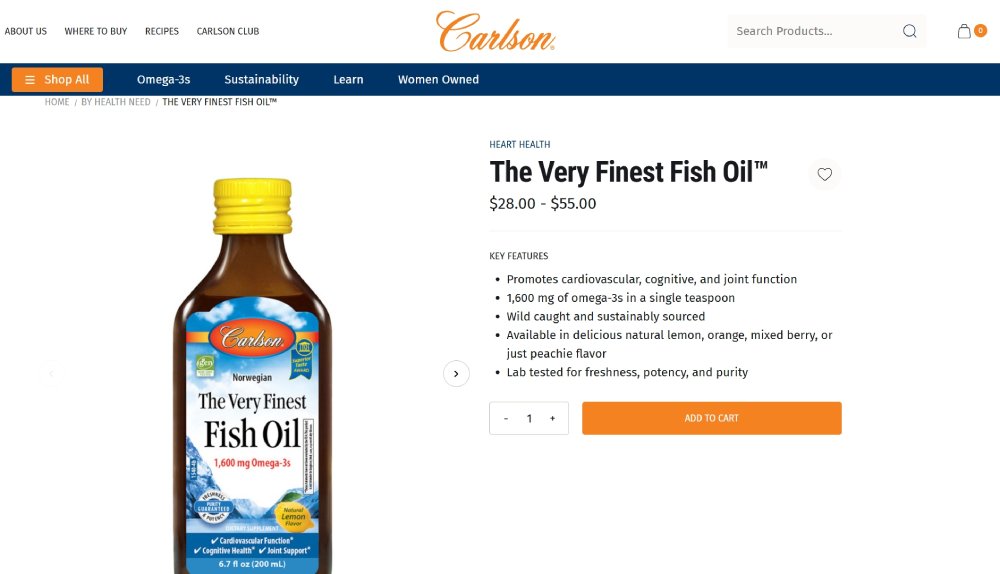
Carlson’s The Very Finest Fish Oil provides 1,600mg of fish oil per serving. This liquid supplement is lemon-flavored to mask the fishy taste.
The product is sourced from deep, cold-water fish and is purified to remove potential contaminants. It’s also regularly tested by an independent FDA-registered laboratory.
Pros:
- High dose of omega-3s
- Liquid form for easy dosing
- Pleasant lemon flavor
- Rigorously tested for purity
- Supports heart, brain, and vision health
Cons:
- Liquid form may not be convenient for everyone
- Needs refrigeration after opening
New Chapter Wholemega Fish Oil 2,000mg
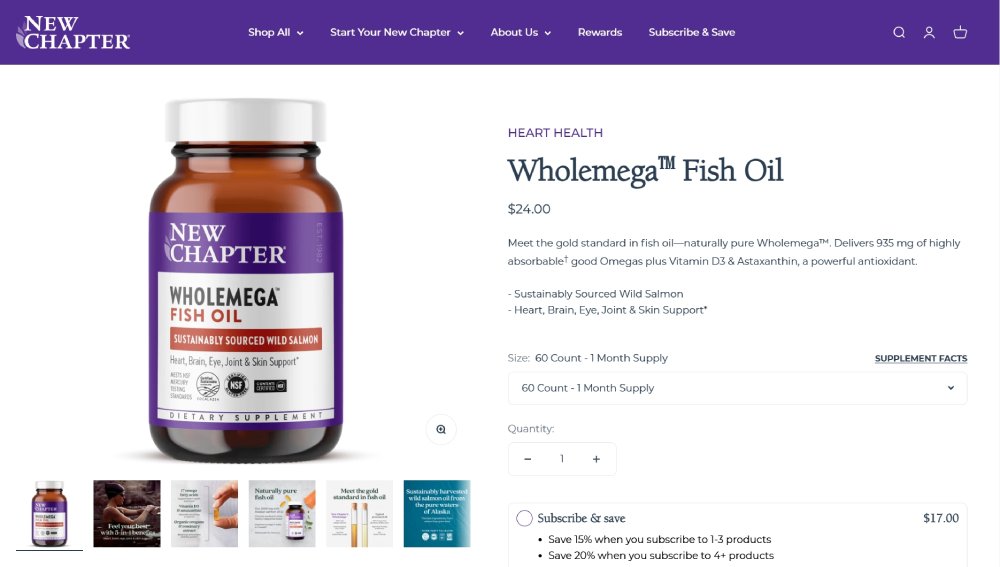
New Chapter Wholemega Fish Oil offers 2,000mg of wild Alaskan salmon oil per serving. This supplement provides a full spectrum of 17 omega fatty acids, not just EPA and DHA.
The product uses a gentle extraction process to preserve the natural nutrient profile of the fish oil. It’s also Non-GMO Project Verified and sustainably sourced.
Pros:
- Full spectrum of omega fatty acids
- Sustainably sourced from wild Alaskan salmon
- Non-GMO Project Verified
- Supports heart, brain, and eye health
- No fishy aftertaste
Cons:
- Higher price point
- Requires taking two softgels per serving
Key Factors to Consider When Choosing a Fish Oil Supplement
When shopping for fish oil, it’s crucial to look at several key aspects to ensure you’re getting a high-quality product. These factors can impact the supplement’s effectiveness and safety.
Purity and Quality Standards
Fish oil quality varies widely among products. Look for supplements that have been third-party tested for purity. These tests check for contaminants like mercury, PCBs, and other toxins.
Choose brands that follow Good Manufacturing Practices (GMP). This ensures consistent quality and safety standards.
High-quality fish oil supplements often have certifications from organizations like the International Fish Oil Standards (IFOS) or NSF International. These certifications show the product meets strict purity and potency standards.
Some brands use molecular distillation to remove impurities. This process can help ensure a cleaner, safer product.
EPA and DHA Content
EPA (eicosapentaenoic acid) and DHA (docosahexaenoic acid) are the two main omega-3 fatty acids in fish oil. They offer different health benefits.
Check the label for the specific amounts of EPA and DHA. Don’t just look at the total omega-3 content.
A potent fish oil supplement should provide at least 1,000 mg of combined EPA and DHA per serving. Some products offer up to 1,500 mg for greater benefits.
The ratio of EPA to DHA can be important depending on your health goals. Higher EPA may be better for mood support, while higher DHA can benefit eye and brain health.
Consider your dietary intake of omega-3s from fatty fish. If you eat fish regularly, you may need less from supplements.
Freshness and Oxidation Levels
Fish oil can go rancid, which reduces its benefits and may be harmful. Fresh fish oil shouldn’t have a strong fishy smell or taste.
Look for products with added antioxidants like vitamin E or astaxanthin. These help prevent oxidation and extend shelf life.
Check the expiration date and avoid products nearing expiration. Store your fish oil in a cool, dark place to maintain freshness.
Some brands use special packaging or processing techniques to reduce oxidation. These can include nitrogen-flushed bottles or opaque containers.
Source of the Fish Oil
The type of fish used affects the oil’s omega-3 profile and potential contaminants. Common sources include:
- Anchovy
- Sardine
- Mackerel
- Cod liver
- Krill
Wild-caught fish often have higher omega-3 levels than farmed fish. However, farmed fish can be a more sustainable option.
Krill oil is gaining popularity due to its high absorption rate and additional nutrients like astaxanthin.
Consider the environmental impact of the fishing practices used to source the oil. Look for brands that use sustainable fishing methods.
Capsule Size and Dosage
Capsule size can affect how easy the supplement is to swallow. Larger capsules may contain more oil but can be difficult for some people to take.
Check the recommended dosage. Some products require multiple capsules per day to reach the desired omega-3 intake.
Liquid fish oil is an alternative if you struggle with capsules. It can be mixed into food or drinks.
Consider the triglyceride form of fish oil. It’s more easily absorbed by your body compared to the ethyl ester form.
Omega-3 supplements can interact with certain medications. Always consult your doctor about the right dosage for your needs.
How to Choose an Omega-3 Supplement
Picking the right omega-3 supplement depends on several key factors. You’ll need to consider your personal needs, the product’s quality, and any health issues you may have.
Personal preference
Fish oil supplements come in different forms. You can choose soft gel capsules, liquid fish oil, or fish oil pills. Soft gels are popular because they’re easy to swallow and don’t have a strong taste.
Liquid fish oil gives you more control over dosage. It’s a good choice if you need higher amounts of omega-3s.
Fish oil pills are another option. They’re usually smaller than soft gels but may need to be taken more often.
Think about which form fits best into your daily routine. Also consider the taste and smell, as some people find certain types more pleasant than others.
Quality and safety
Look for fish oil supplements that are third-party tested. This means an independent lab has checked the product for quality and purity.
Check the label for the amounts of EPA and DHA. These are the two main types of omega-3 fatty acids that provide health benefits.
Choose supplements made from small, fatty fish like anchovies or sardines. These tend to have lower levels of contaminants.
Look for products that use molecular distillation. This process removes impurities like mercury and PCBs.
Health concerns
Talk to your doctor before starting any new supplement, especially if you have health issues or take medications.
If you’re allergic to fish, look for algae-based omega-3 supplements instead.
For heart health, supplements with more EPA may be better. For brain health, higher DHA content might be preferred.
If you’re pregnant or breastfeeding, make sure to choose a supplement free from mercury and other contaminants.
Consider your diet. If you eat fatty fish regularly, you might need a lower dose supplement or none at all.
How to Read Fish Oil Supplement Labels
Reading fish oil labels can be tricky. Knowing what to look for helps you choose the best product for your needs. Let’s break down the key parts of a fish oil label.
Identifying the EPA and DHA Content
EPA and DHA are the most important parts of fish oil. Look for the specific amounts of EPA and DHA on the label. These are usually listed in milligrams (mg) per serving. A good fish oil will clearly show these numbers.
Don’t just look at the total fish oil amount. Focus on EPA and DHA. Some labels may say “1000 mg fish oil” but only have 300 mg of EPA and DHA combined. You want to know exactly how much EPA and DHA you’re getting.
Remember, your doctor may recommend a certain dose. You might need to take multiple servings to reach that amount. Do the math to figure out how many pills or teaspoons you need.
Recognizing Additives and Preservatives
Check the label for any extra ingredients. Some additives help keep the oil fresh. Others might be there for taste or to make the pills easier to swallow.
Common additives include:
- Vitamin E (tocopherols): A natural preservative
- Gelatin: Used in softgel capsules
- Flavorings: Often used in liquid fish oils
Look for labels that say “non-GMO” if that’s important to you. Some high-quality fish oils are also dairy-free and gluten-free.
Be wary of long lists of ingredients. The best fish oils often have very few additives.
Spotting Quality Certifications
Quality fish oils often have third-party testing certificates. These show the oil has been checked for purity and potency.
Look for these marks on the label:
- IFOS (International Fish Oil Standards)
- ConsumerLab seal
- USP verified mark
These certifications mean the product has been tested for heavy metals and other contaminants. They also check that the EPA and DHA amounts match what’s on the label.
Some brands offer a Certificate of Analysis. You can usually find this on their website. It gives detailed info about the oil’s purity.
Sustainability matters too. Look for labels like “Friend of the Sea” or “Marine Stewardship Council”. These show the fish were caught using sustainable methods.
Precautions for OTC Omega-3 Supplements
When taking over-the-counter (OTC) omega-3 supplements, you should be aware of a few key precautions.
First, check the label for any potential allergens. If you have a fish allergy, avoid fish oil supplements and opt for plant-based alternatives.
Be cautious of potential side effects. Some people may experience:
- Fishy burps
- Digestive discomfort
- Increased bleeding risk
If you’re taking blood thinners, talk to your doctor before starting omega-3 supplements.
Quality is crucial. Look for supplements that have been third-party tested for purity. This helps ensure they’re free from contaminants like mercury and other heavy metals.
Pay attention to the source of omega-3s. Some products use canola oil as a filler, which may not provide the same benefits as pure fish oil.
Store your supplements properly. Keep them in a cool, dark place to prevent oxidation and maintain potency.
Start with a lower dose and gradually increase it. This can help minimize potential side effects.
Remember, supplements aren’t regulated as strictly as medications. Choose reputable brands and consult your healthcare provider for personalized advice.
Frequently Asked Questions
What are the potential benefits of taking fish oil supplements for women’s health?
Fish oil supplements can support women’s health in several ways. They may help reduce menstrual pain and improve mood. Some studies suggest fish oil might lower the risk of breast cancer. Fish oil can also support heart health and brain function in women of all ages.
How does omega-3 intake impact inflammation and which supplement is recommended?
Omega-3s in fish oil can help reduce inflammation in your body. This may ease joint pain and stiffness. For inflammation, look for supplements high in EPA. Nordic Naturals Ultimate Omega is a good choice for reducing inflammation.
Which fish oil brand is considered the most effective for lowering cholesterol?
Many fish oil brands can help lower cholesterol. Look for ones with high EPA and DHA content. Nature Made Fish Oil Plus Vitamin D is a budget-friendly option that may help improve cholesterol levels.
What factors should be considered when choosing a fish oil supplement for joint pain relief?
For joint pain, choose a fish oil supplement with high EPA content. Look for products tested for purity and potency. Consider the dose – higher amounts may be more effective. Some people find liquid fish oil easier to take than capsules for joint health.
Are there any particular interactions between fish oil and other substances that should be avoided?
Fish oil can interact with blood thinners like warfarin. It may also affect blood sugar control in people with diabetes. Talk to your doctor if you take any medications. Avoid taking fish oil with other omega-3 supplements to prevent excessive intake.
In comparison to straight omega-3 supplements, do fish oil capsules offer similar benefits?
Fish oil capsules and straight omega-3 supplements can both provide health benefits. Fish oil contains EPA and DHA, two important omega-3s. Straight omega-3 supplements may have higher concentrations of these fatty acids. Both can help with inflammation and joint health.
Conclusion
Fish oil supplements can be a good way to get more omega-3s in your diet. When choosing one, look for products with high amounts of EPA and DHA. These are the main types of omega-3s that give health benefits.
Check that the supplement you pick is tested for purity. This helps make sure it doesn’t have too many toxins. It’s also smart to pick a brand that uses third-party testing.
The dose you need may be different from what others take. Talk to your doctor about how much fish oil is right for you. They can help you figure out the best amount based on your health and goals.
Remember, fish oil isn’t magic. It works best as part of a healthy diet and lifestyle. Eating fish, exercising, and eating lots of fruits and veggies are all important too.
If you don’t like the taste of fish oil, try flavored options or capsules. These can make taking your supplement easier and more pleasant.
Lastly, keep your fish oil in a cool, dark place. This helps it stay fresh and work well. With the right choice and care, fish oil can be a helpful addition to your health routine.

